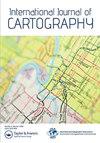神经自适应移动地理信息显示:一个新兴的地图研究前沿
IF 0.9
Q4 COMPUTER SCIENCE, INFORMATION SYSTEMS
引用次数: 2
摘要
机动性,包括导航和寻路,是人类生存的基本需求。几千年来,地图对人类的流动和生存起着重要的作用。然而,对数字gnss导航辅助的日益依赖正在影响人类的注意力资源,并限制我们天生的空间认知能力。为了减轻人类的技能下降,我们提出了一个神经适应(移动)地图研究前沿,并迈出了创建设计良好的移动地理信息显示器(mGIDs)的第一步,它不仅可以实时响应导航员在导航过程中的认知负荷和视觉空间注意力资源,而且还能够在保持导航效率的同时支撑空间学习。反过来,这将帮助人类保持独立于地理信息技术,正如人们所希望的那样。本文章由计算机程序翻译,如有差异,请以英文原文为准。
Neuroadaptive mobile geographic information displays: an emerging cartographic research frontier
Mobility, including navigation and wayfinding, is a basic human requirement for survival. For thousands of years maps have played a significant role for human mobility and survival. Increasing reliance on digital GNSS-enabled navigation assistance, however, is impacting human attentional resources and is limiting our innate cognitive spatial abilities. To mitigate human de-skilling, a neuroadaptive (mobile) cartographic research frontier is proposed and first steps towards creating well-designed mobile geographic information displays (mGIDs) that not only respond to navigators’ cognitive load and visuo-spatial attentional resources during navigation in real-time but are also able to scaffold spatial learning while still maintaining navigation efficiency. This in turn, will help humans to remain as independent from geoinformation technology, as desired.
求助全文
通过发布文献求助,成功后即可免费获取论文全文。
去求助
来源期刊

International Journal of Cartography
Social Sciences-Geography, Planning and Development
CiteScore
1.40
自引率
0.00%
发文量
13
 求助内容:
求助内容: 应助结果提醒方式:
应助结果提醒方式:


